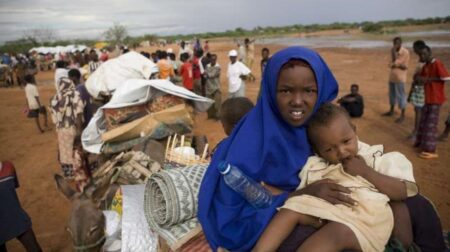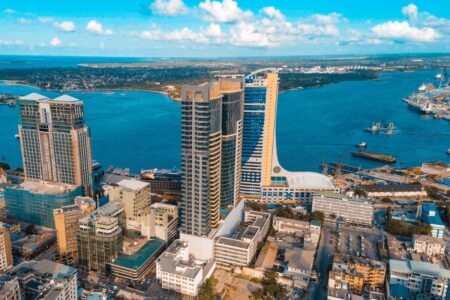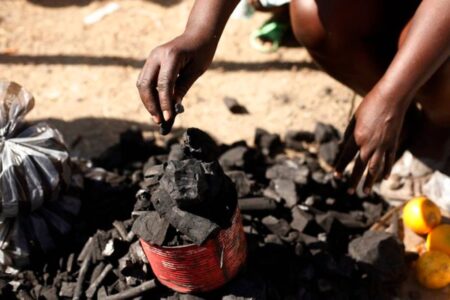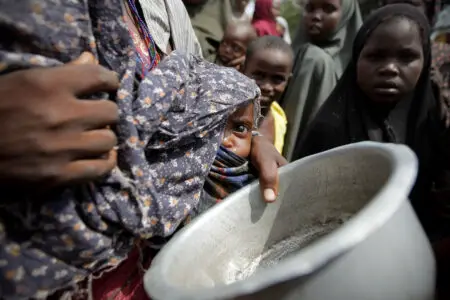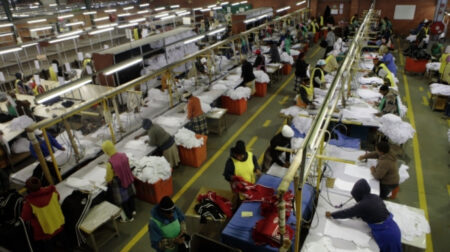- How transition finance can catalyse Africa’s green industrial revolution
- Stanbic PMI Report: Mixed performance as Kenya’s agriculture, construction offset manufacturing decline
- Uganda’s land management gets a tech makeover to boost transparency
- Nigeria’s output dips fastest in 19 months on a sharp rise in costs
- Apple faces growing backlash over Congo exploitation
- Why East Africa is staring at higher wheat prices in 2025
- Nairobi Gate SEZ pumps $7 million into Kenya’s agro-processing industry
- What impact will the US election have on Africa?
Browsing: World Bank
- Competition for workers is rising significantly as populations age in rich and middle-income countries.
- In Sub-Saharan Africa, the Caribbean, and the Pacific, people with tertiary education are 30 times more likely to emigrate than those who are less educated.
- This migration can aggravate a shortage of skilled workers to provide essential services such as health care. And since governments cannot prevent people from leaving, they need to expand the training capacity for such skills, experts say.
Populations across the globe are aging at an unprecedented pace, turning many countries increasingly reliant on migration to realize their long-term growth potential, according to a new report from the World Bank.
The World Development Report 2023: Migrants, Refugees, and Societies, identifies this trend as a unique opportunity to make migration work better for economies and people.
Wealthy countries, as well as a growing number of middle-income countries—traditionally among the main sources of …
- Tanzania’s economic reform program is progressing well in a challenging global economic environment and the authorities remain committed to IMF’s loan plan.
- Ongoing reforms in the country touch on strengthening the economic recovery, preserving macroeconomic stability, and supporting structural reforms toward sustainable and inclusive growth.
- Tanzania’s three-year Extended Credit Facility Arrangement for total access of about $1,046.4 million at the time of program approval received the greenlight on July 18, 2022
The International Monetary Fund (IMF) has given Tanzania’s economy a shot in the arm by furnishing the country with $153 million loan, bringing to around $304.7 million, the amount received so far under the lender’s extended credit arrangement struck in July last year.
The loan will be channeled towards economic recovery, preserving macro-financial stability, and promoting sustainable and inclusive growth.
IMF argued that reforms centre on strengthening fiscal space to allow for much-needed social spending and high-yield public investment, …
- Tanzania’s government has banned institutions from using charcoal and firewood for their energy needs.
- Tanzania has lost 16 percent of its forest cover to human-related activities.
- 85 percent of Tanzania’s energy needs are met with charcoal and firewood burning.
To curb the destruction of forests, Tanzania has set a deadline for its own institutions to stop using charcoal and firewood, an ambitious gesture for a country whose 85 percent of energy needs are met through the burning of charcoal and firewood.
As a result of this high dependence on forests for its energy needs, Tanzania’s forests are being depleted at a tremendous pace; 16 percent of forest cover has already been lost to date. At the current rate, Tanzania is losing over 640,429 hectares of forest per year.
The forest loss is mostly blamed on human activities related to unsustainable farming practices, development activities and to meet the huge energy …
- Central Bank of Kenya (CBK) data shows remittance inflows in March hit $357.0 million compared to $309.2 million in February, an increase of 15.5 percent.
- Kenyans living and working abroad sent home $349.4 million in January, with the February figure being the lowest receipt since July last year.
- The cumulative inflows for the 12 months to March 2023 totaled $4 billion compared to $3.9 billion in a similar period in 2022.
Kenyans in the diaspora sent home more money in the month of March compared to February and January, defying inflationary pressures being felt by households across the globe.
Central Bank of Kenya (CBK) data shows remittance inflows in March totaled $357.0 million compared to $309.2 million in February, an increase of 15.5 percent.
The inflows were $349.4 million in January, with the February figure being the lowest receipt since July last year.
The cumulative inflows for the 12 months …
- AfDB announces US$ 1.5 billion funding for emergency food responce
- AfDB pledges seeds & fertilizers for 20 million smallholder farmers
- Oxfam warns of famine in Somalia
In May 2022, the African Development Bank (AfDB) Board of Directors approved $1.5 billion in funding for what the bank called the African Emergency Food Production Facility; one year down the road, has the funding achieved its purpose?
AfDB President Akinwumi Adesina described the facility as a necessary support for Africa’s emergency food response in the face of shortages caused by the Russia-Ukraine war.
The bank’s President said the funding will help to significantly increase food production in Africa and avert what he at the time described as ‘the looming food crisis caused by the Russia-Ukraine war.’
Making the announcement at the Summit of G7 leaders last year in Washington, Mr. Adesina announced that the African Development Bank (AfDB) would out of its own …
- Index shows that 90% of Kenya’s consumers who receive money transfers want integrated mobile ‘super apps’ so they can manage remittances with other financial needs.
- Kenya’s receivers want choice in digital and in-person remittance platforms as they look to the future.
- Kenya is a leader when it comes to financial innovation especially in the world of mobile money.
Kenya’s consumers are calling for greater innovation in international money transfer services so they can easily manage their personal finance needs.
According to Western Union’s inaugural Global Money Transfer Index, about 90 per cent of Kenya’s receivers want providers to offer remittance services in an integrated mobile ‘super app’, so they can efficiently manage collecting remittances with other commitments, such as paying for utilities.
The Global Money Transfer Index asks consumers how, when and why they use international money transfer capabilities today, as well as their expectations for tomorrow.
The results …
- US World Bank President nominee Ajay Banga chooses Africa for his first tour
- AfDB president Dr. Akinwumi Adesina calls for a new measure of economic growth
- AfDB launches Adesina Africa Industrialization Index (AII)
The World Bank is getting a new president and it will be likely US-nominee Ajay Banga who for his first global tour, chose to visit Africa. What does this maiden tour mean for the continent?
Back in February, US President Joe Biden announced Ajay Banga as the United States’ nominee for President of the World Bank Group. Should he be approved, Ajay Banga will be replacing the incumbent president, David Malpass, whose term ends in June.
Among his first moves on his way to the top office in the world’s largest financial institution, Banga, is making a strategic visit to Africa.
For the first stop of his World tour, Mr. Banga flew to Abidjan Côte d’Ivoire on …
- The influx of used clothes from the west in effect affects the development of textile industries in the EAC
- Five years later, a new administration, Covid-19 and the Russia-Ukraine war not to mention a stronger China economy, the US may reconsider EAC state’s position.
- EA States have 2 years to consider if they want AGOA renewed
In 2015, all major economies in East Africa, Kenya, Uganda, Tanzania, Rwanda and Ethiopia proposed to ban the importation of second-hand clothes but the US would have none of it.
The intention was good, even noble: Banning second-hand imports would strengthen the domestic textile industry which would create jobs and other positive ripple effects.
“The US claimed this proposal goes too far and violates the African Growth and Opportunity Act (AGOA), which aims to expand trade and investment on the continent,” the media reported.
Once the US pulled the AGOA card, the East African …
Against all odds, Africa is enjoying faster economic growth than the rest of the world, and it will continue to do so for the next foreseeable future. This is according to the latest review by the Africa Development Bank (AfDB) which projects that the continent’s Gross Domestic Product (GDP) will grow 4% annually, on average, much better than the global average.
Released in Abidjan, Africa’s Macroeconomic Performance and Outlook Report indicates that in the medium-term, most regions in Africa will have moderate to strong economic performance.
“Despite facing significant headwinds due to global socio-economic shocks, all the five regions on the continent remain resilient with a steady outlook,” the report reassures stakeholders.
Also Read: Financing SMEs: Basis for impressive economic outlook
However, the report does highlight some red flags to watch out for that will require robust monetary and fiscal measures and structural policies.
The report is released at the …
- Tanzania inflation hits five year high
- Zanzibar bans export of food commodoties ahead of Holy Month
- China reopens market, expected to speed global recovery
Tanzania’s annual inflation rate has hit its highest point in five years clocking 4.9% in January 2023 and at the close of February the rate was no better.
According to the Tanzania Central Bank The Bank of Tanzania (BoT), the prices of food & non-alcoholic beverages went up by 9.9% up from 9.7% in December of last year.
The BoT monthly economic update report showed similar increase in prices across all sectors and indicator that the cost of living in Tanzania has increased drastically. Wit no matching increase in income, this means that the burden of acquiring daily basic needs like food has become worse for Tanzanians.
With percentages in the brackets here are how several sectors are suffering from price increase in Tanzania: Transportation (6.2% …





